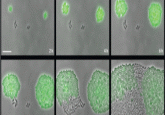Killing the ‘un-killable’

New target could help in overcoming antibiotic resistance.

The bacterium Pseudomonas aeruginosa is a highly antibiotic-resistant microbe that is a common cause of healthcare-associated infections such as pneumonia, and bloodstream or urinary tract infections. In individuals with cystic fibrosis, P. aeruginosa can cause lifelong lung infections, which are the leading cause of death in those with weakened defense and immune systems
In a study recently published in PNAS, a team of researchers from the McGill University Health Centre (QC, Canada) have found a new cellular target that is able to weaken the P. aeruginosa bacterium, making it more susceptible to antibiotics.
They discovered that, when under stress or lacking nutrients, the bacterium uses a stress signaling system and defense enzyme to modify its cell membrane and therefore enhance its resistance to antibiotics; inhibition of this enzyme and system could weaken it, increasing its permeability to molecules and allowing antibiotics to enter the cell.
“We identified a new function important to antibiotic tolerance, which could be targeted to enhance the activity of our current antibiotics,” commented lead study author Dao Nguyen. “This is critical if we want to improve the efficacy of our antibiotics and prevent such treatments from failing.”
“In the long run, the discovery of this promising cellular target could expand the utility of our antibiotics and make new ones more effective,” she concluded.





